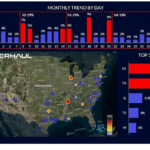If you’re planning to hit the road this holiday season, be prepared for heavy traffic as around 107 million people are expected to travel to their holiday destinations by car.
According to AAA, a total of 119.3 million individuals will journey at least 50 miles from home during the year-end holiday period, which runs from Saturday, Dec. 21, to Wednesday, Jan. 1. This year’s travel forecast slightly exceeds the record set in 2019 by 64,000 travelers. Compared to last year, AAA anticipates an additional 3 million people traveling this holiday season.
“This is the time of year when lifelong memories are made with loved ones, and travel plays a big role in that,” said Stacey Barber, Vice President of AAA Travel. “This year, with Christmas Day falling on a Wednesday, we’re anticipating record-breaking travel numbers the weekend before and the weekend after the holiday.”
Driving remains the most popular choice for holiday travel, with nearly 90% of travelers hitting the road. AAA estimates that 107 million people will travel by car this season. While this is 2.5 million more than last year, it falls just short of the 2019 record of 108 million.
Gas prices are lower than last year, when the national average hovered around $3.12 during late December 2023. Factors such as colder weather, an increase in remote work, and more online holiday shopping have contributed to decreased gas demand this month.
Transportation analytics firm INRIX predicts that the worst traffic delays will occur on the weekends leading up to Christmas and New Year’s. However, traffic congestion is expected to be minimal on the holidays themselves. Drivers in cities like Boston, New York, Seattle, and Washington, DC could face delays twice as long as usual, and nationwide travel times may increase by up to 30%.
“With a near record number of auto travelers expected this holiday season, drivers should expect delays in and around major metro areas, with Sunday, Dec. 22 expected to be the nation’s worst day to travel,” says Bob Pishue, transportation analyst at INRIX. “Our advice is to avoid traveling during peak commuting hours during the week. If schedules allow, leave bright and early or after the evening commute.”
The year-end holiday travel period for this forecast spans 12 days, running from Saturday, Dec. 21, to Wednesday, Jan. 1. AAA defines the holiday travel period based on the calendar, ranging from 10 to 13 days depending on which days Christmas and New Year’s Day fall. This year’s period is two days longer than last year’s.
A longer holiday travel window provides travelers with more flexibility for departure and return dates. However, like all year-end holiday periods, this one includes two weekends, which are typically the busiest travel days.





